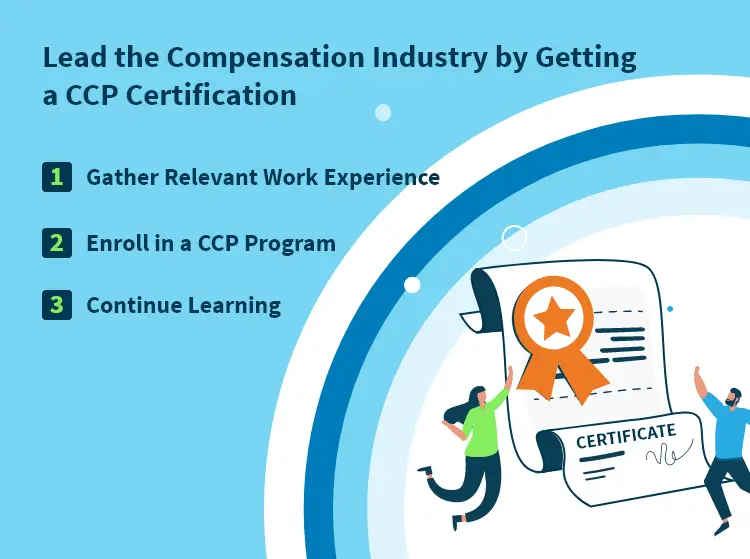Lead the Compensation Industry by getting a CCP Certification

- Step 1. Gather Relevant Work Experience
- Step 2. Enroll in a CCP Program
- Step 3. Continue Learning
Are you interested in exploring a career in the field of compensation? Do you enjoy the challenge of crunching numbers in a spreadsheet and analyzing data to create a pay system that benefits employees and the organization? If yes, becoming a compensation specialist might be right for you!
Organizations are investing in finding equitable ways to strengthen their compensation strategy for their workforce. As fair pay has a profound impact on productivity and employee retention, companies are now looking for human resources (HR) personnel who can demonstrate an expert level of skills in implementing a competitive compensation plan. To be at the top of the list of the leadership's candidates to do this job, you should acquire a Certified Compensation Professional certification.
In this article, you will get to:
Know what a Certified Compensation Professional is.
Learn how to become a Certified Compensation Professional.
Understand the benefits of being a Certified Compensation Professional.
Knowing the Path
A Certified Compensation Professional, or CCP, is a certification acquired by compensation specialists after passing a series of courses and examinations from recognized organizations. It is a designation that proves that the individual has the knowledge and training required to manage the pay distribution system of an organization. As a CCP, you are generally responsible for administering fair pay rates, designing equity strategies, and communicating them from the leadership and senior level down to the bottom line.
Individuals who become Certified Compensation Professionals usually have a bachelor’s degree in human resources, business, finance, or a related field. They work to gain experience and develop skills to become a compensation specialist. A characteristic of a CCP is having a strong analytical capability since they need to analyze market trends to determine compensation strategy. Since the profession deals with people in an organization, a good quality of a CCP involves being detail-oriented. They have to understand the behavior of employees to fit compensation into the goals of the company.
Moving Upwards
If you are an experienced HR personnel looking to expand your job opportunities and grow in the field of compensation, earning the CCP certification is a promising next step for you. Let us discuss how you can earn this badge with the following steps:
Gather Relevant Work Experience
An HR personnel can acquire practical experience in compensation by working in jobs related to human resources, compensation, or finance. Practical experience is essential to understanding the real-world applications of the compensation principles you will learn in the program. You may start as an HR generalist or a finance professional with an MBA wanting to specialize in compensation. Corporate experience will show you the challenges of designing a compensation system and the impact it has on staffing and performance management.
Enroll in a CCP Program
A CCP certification can be obtained from WorldatWork, a human resource association that helps compensation and HR professionals gain skills and credentials with Total Rewards education. Candidates must take the CCP training courses and pass the ten exams that cover the knowledge and skills in compensation such as base and variable pay administration, total rewards management, job analysis, accounting, regulatory compliance, market pricing, and rewards communication.
To pass the exams, one must study the courses related to the certification. An individual has three study options they can choose to prepare for the tests and the costs will depend on whether you are a member of WorldatWork or not:
Traditional or virtual classroom – this program is open to candidates who want to take the two-day courses designed by WorldatWork before they take the exam. It includes live instruction by seasoned compensation professionals and participant interaction.
Self-study with materials – a candidate can select this option with learning materials from WorldatWork. This costs less than attending the classroom.
Self-study without materials – you can also self-study outside of the job description module and just opt to take the exam by WorldatWork.
While the self-study option can be convenient to manage your own time, you would miss out on the opportunity to interact with the instructors and the networking you would get from other candidates. To better prepare yourself for the exam, you can join study groups or partner with colleagues who are also pursuing the certification. The CCP certification is costly, and time must be devoted to studying for the tests. A compensation professional usually needs two to three years to complete and pass the certification, depending on the available funds they have.
Continue Learning
When you earn the CCP certification and you are looking to expand into global compensation, you can also proceed to earn a higher qualification by becoming a Global Remuneration Professional (GRP). When you have completed the course module of CCP and passed the certification, this means you have nearly completed the courses required for GRP and you just need to pass the test that covers international remuneration.
A Certified Compensation Professional does not need to renew certification through re-examination, but he or she must earn Continuing Education Units (CEU) proving that you have remained active in the industry. This can be acquired by becoming a member of WorldatWork where you can get access to valuable resources and updates on industry trends. You can also gain units by attending classes or conferences or teaching compensation.
After becoming a Certified Compensation Professional, the next level you can achieve is the Advanced Certified Compensation Professional. This credential confirms your ability to manage compensation programs and use advanced analysis techniques.
Enjoying the Benefits
Becoming a Certified Compensation Professional offers exciting career rewards:
Healthy Job Prospects
Organizations are pressured to comply with corporate governance regulations and legal requirements, they need professionals to account for payroll expenses. While certification is not mandatory for compensation specialists, it is now becoming more common to have it, and employers often require it as this will give them confidence on the job skills of a compensation professional.
At Salary.com, our CompAnalyst employs compensation professionals who are expert at solving pay inequities in a company and recommend actions to manage their salary structure to make it competitive in the market.
Higher Earnings
Earning the CCP certification indicates that you possess expert knowledge about the field of compensation, and earning this badge will cost you time and money. You can use this designation to negotiate a salary raise with your current employer or leverage this when searching for a new position.
Promotion
The new skills you will learn after obtaining the CCP certification will become a factor for your employer to qualify you for promotion to more senior-level positions. You can apply the lessons you learned from the CCP courses to perform your tasks efficiently and this can convince your employer that you are ready to handle bigger responsibilities in a higher position.
Visibility
Compensation professionals are exposed to the highest levels of management compared to mid-level HR professionals. A compensation specialist’s contribution is respected and listened to by senior executives and the performance of an organization is directly related to the work that he or she does.
Embracing the Field of Compensation
Becoming an expert in compensation is a gradual and continuing process. It requires active experience in the field and education in the pursuit of professional development. To be on the frontline of the industry, a Certified Compensation Professional should build a network within the compensation field and join associations that can help keep him or her updated with the latest market trends. Seeking a mentor who is experienced in compensation is valuable to career growth as seasoned professionals provide insights on your progress in the career.
Insights You Need to Get It Right









